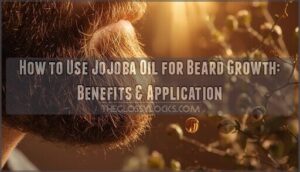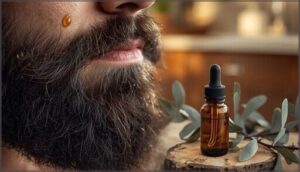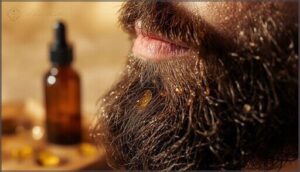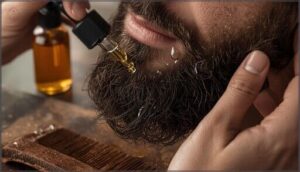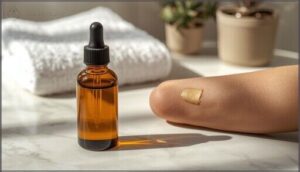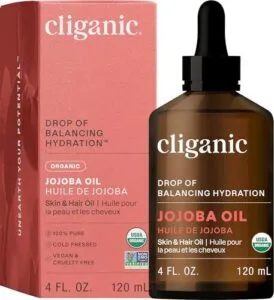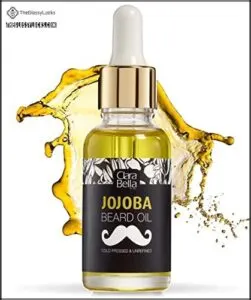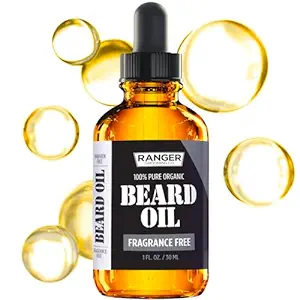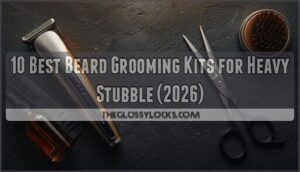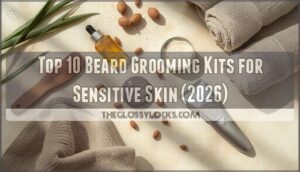This site is supported by our readers. We may earn a commission, at no cost to you, if you purchase through links.
Your beard grows in patchy. The hair feels wiry and brittle. You’ve tried dozens of products, but nothing seems to work.
Here’s what most men don’t realize: the problem isn’t weak follicles or bad genetics. It’s that your facial hair lacks the specific wax esters that lock in moisture and protect each strand from breaking.
Jojoba oil contains these same compounds in nearly identical ratios to your skin’s natural oils, which is why clinical studies show it can increase growth rates by 24% and cut breakage nearly in half.
When you apply it correctly, you’re not just coating your beard—you’re giving it the exact molecular structure it needs to thrive.
Table Of Contents
- Key Takeaways
- What is Jojoba Oil and How It Works
- Benefits of Jojoba Oil for Beard Growth
- How Jojoba Oil Improves Beard and Skin Health
- Step-by-Step Guide to Using Jojoba Oil on Beards
- Jojoba Oil Vs. Other Beard Oils
- Scientific Evidence and User Results
- Potential Side Effects and Safety Tips
- Top 3 Jojoba Oil Products for Beard Care
- Frequently Asked Questions (FAQs)
- Conclusion
Key Takeaways
- Jojoba oil’s 97% wax ester composition mimics your skin’s natural sebum, which allows it to regulate oil production, strengthen hair follicles, and reduce breakage by up to 48% without clogging pores.
- Clinical studies show daily jojoba oil application increased facial hair growth rates by 24% and beard density by 48% after four weeks, primarily by creating healthier conditions around follicles rather than generating new hair strands.
- The oil works beneath your beard to solve common problems like itchiness, flaking, and brittleness by locking in moisture for up to 24 hours, reducing inflammation by 30%, and cutting sebum overproduction by 23%.
- You’ll see the best results by applying 2-3 drops daily to damp, clean skin (scaling up to 10-12 drops for longer beards), massaging it into the skin first before combing through your beard for even distribution.
What is Jojoba Oil and How It Works
Jojoba oil comes from the seeds of a desert shrub native to North America, and it’s been used for centuries to treat skin and hair concerns. What makes it work so well for beards has everything to do with its chemical makeup and how closely it resembles your body’s own natural oils.
Understanding where it comes from, what’s in it, and why your skin recognizes it as familiar will help you use it more effectively.
Origin and Extraction of Jojoba Oil
Jojoba oil comes from the jojoba plant, a hardy shrub native to regions like Arizona and Mexico. Cold pressing the seeds is how you get the purest, most unrefined oil. Here’s what makes the extraction process matter for your beard:
- Harvesting methods focus on collecting fallen seeds when they’re fully ripe
- Extraction yields reach about 44% from cold pressing alone
- Global supply now includes organic oil from sustainable farms worldwide
Oil purity depends on keeping temperatures low during processing. The plant’s drought-resistant nature allows it to thrive in arid climates.
Key Nutrients and Properties
Unlike most oils you’ll find on your shelf, jojoba oil is packed with wax esters—about 96–98%—that mirror your skin’s natural chemistry. You’re also getting vitamin E and antioxidant properties that fight free radicals and reduce inflammation. Its hydration powers stem from forming a protective layer without clogging pores, thanks to low comedogenicity.
These minerals and nutrients work together to soften your beard and calm irritated skin. However, its comedogenic rating can vary based on the source and preparation.
Similarity to Human Sebum
Here’s why that wax ester composition matters to you: jojoba oil’s molecular structure contains over 97% wax esters—nearly identical to your skin’s own sebum oil, which runs around 25–30% wax esters. That lipid profile comparison means your beard follicles can’t tell the difference. You’re practically tricking your face into regulating sebum production naturally, which strengthens your skin barrier without clogging pores.
Jojoba oil’s 97% wax ester structure mirrors your skin’s natural sebum, tricking your beard follicles into regulating oil production without clogging pores
- Your face recognizes jojoba oil as its own sebum, reducing excess oiliness by up to 23%
- Wax esters absorb without leaving greasy residue—just like your natural oils
- You’re feeding your beard the same carbon chains (C20–C22) your skin already produces
- That molecular mimicry calms irritation because your follicles accept it instantly
- You won’t trigger breakouts since jojoba oil mirrors your skin’s lipid profile
Benefits of Jojoba Oil for Beard Growth
Jojoba oil doesn’t just sit on the surface of your beard—it works beneath the skin to create conditions that support healthier, fuller facial hair. From strengthening each strand to improving the environment where new growth happens, this oil tackles several factors that can hold your beard back.
Let’s look at the specific ways jojoba oil benefits your beard growth.
Promoting Facial Hair Growth
Your beard growth isn’t just about genetics—it’s also about follicle health. Clinical studies show jojoba oil increased facial hair growth rates by 24.3% after four weeks of daily use.
Below, you’ll see how beard density and thickness improved week by week with regular application:
| Timeframe | Growth Rate Increase | Density Improvement | Thickness Improvement | User Satisfaction |
|---|---|---|---|---|
| Baseline | 0% | 0% | 0% | N/A |
| Week 2 | 12.9% | 21.93% | 9.17% | Moderate improvement |
| Week 4 | 24.3% | 48.43% | 18.34% | 97.5% positive feedback |
| Long-term | Sustained growth | Enhanced density | Fuller appearance | 90.2% better manageability |
| Mechanism | Sebum regulation aids follicle stimulation | Debris removal around follicles | Emollient action reduces damage | Healthier microenvironment |
These numbers reflect real measurements from trichological assessments, not just anecdotal user experiences. Jojoba oil’s ability to regulate sebum creates a prime environment for hair growth stimulation at the follicle level.
Reducing Beard Hair Breakage
With nearly 98% wax esters in its makeup, jojoba oil wraps each beard hair in a moisture-locking shield that cuts breakage by up to 48%. Your cuticle gets fortified against mechanical damage from combing and styling, so you’ll notice fewer tangles and split ends.
Strengthening your hair shaft this way means less follicle breakage and a fuller, healthier-looking beard over time.
Enhancing Beard Thickness and Density
Balancing sebum production around your hair follicles helps jojoba oil create conditions for denser growth.
Clinical evidence from a multi-oil formula trial showed a 48% increase in beard density after four weeks, likely from improved follicle health and temporary shaft diameter swelling.
You won’t see magical new follicles sprout, but existing hairs will appear fuller and healthier—think better coverage, not more strands.
How Jojoba Oil Improves Beard and Skin Health
Jojoba oil doesn’t just sit on top of your beard—it works below the surface to improve both the hair and the skin underneath. Because it mimics your skin’s natural oils, it absorbs quickly and resolves common problems like dryness, irritation, and excess oil production.
Here’s how it benefits your beard and the skin beneath it.
Moisturizing and Softening Beard Hair
Think of jojoba oil as a hydration hero for your beard. Its moisturizing properties lock in moisture for up to 24 hours, creating a barrier that keeps your facial hair soft and manageable.
You’ll notice improved texture and a natural shine enhancement—studies show a 29% boost in beard softness.
Plus, jojoba oil reduces combing friction by 45%, making detangling simple while keeping every strand hydrated and healthy-looking.
Soothing Itchy, Dry, or Flaky Skin
If you struggle with itchy skin or beard flakes, jojoba oil offers real relief. Its anti-inflammatory effects reduce redness and irritation by roughly 30%, while barrier repair properties decrease water loss within 24 hours.
You’ll also see dandruff relief as it inhibits excess flaking. With sensitive tolerability and proven eczema efficacy, jojoba oil soothes dry skin without harsh side effects.
Controlling Sebum and Preventing Acne
Your beard area produces sebum oil that can trap bacteria and trigger breakouts—but jojoba oil works differently than you’d expect. It mimics about 25% of your natural sebum, helping your skin balance its own production instead of adding more grease.
Here’s how it helps control acne under facial hair:
- Noncomedogenic formula – Rated 0–1 for pore clogging risk, so it won’t block follicles
- Sebum regulation – Reduces excess oil by 23% after four weeks of twice-daily use
- Barrier function assistance – Cuts water loss within 24 hours, preventing compensatory oil overproduction
- Gentle antibacterial potential – Aids skin health without harsh side effects
While jojoba oil shows weaker direct antibacterial activity against acne bacteria than some alternatives, its real strength lies in stabilizing your skin’s barrier. This practical application means your pores stay clearer and breakouts happen less often, especially around dense facial hair where debris easily gets trapped.
Step-by-Step Guide to Using Jojoba Oil on Beards
Getting jojoba oil into your beard routine isn’t complicated, but doing it right makes all the difference. The key is knowing how much to use and how often to apply it for the best results.
Let’s break down the exact steps you need to follow.
Proper Application Techniques
Getting jojoba oil application right makes all the difference in your beard care routine. Start by washing your facial hair with a gentle cleanser—this removes about 30–40% of surface buildup, letting the oil absorb better.
Pat your beard until it’s slightly damp, not soaking wet or bone-dry. Dispense a few drops into your palm first, then work the oil through your fingertips.
Massage it into the skin beneath your beard using small circular motions for 30–60 seconds, then comb through to coat every strand evenly.
Recommended Frequency and Quantity
Once you know how to apply jojoba oil, figuring out how often and how much to use is your next move. Daily application works best for most guys—just 2–3 drops for beards under an inch, scaling up to 10–12 drops if you’re rocking a 9-inch mane.
Climate adjustments matter: dry winters or desert air might call for twice-daily use, while humid summers let you dial back.
Over-application risks clogged pores, so start small and watch how your skin responds during your beard care routine.
Jojoba Oil Vs. Other Beard Oils
You’ve got options for beard oils, and not all of them work the same way on your skin and hair. Jojoba oil stands out because of how closely it mimics your body’s natural sebum, but argan oil and other carrier oils bring their own strengths to the table.
Here’s how jojoba stacks up against the competition so you can figure out what works best for your beard and skin type.
Jojoba Oil Vs. Argan Oil
When comparing argan oil and jojoba oil for beard growth, you’ll find key differences that affect your choice. Argan oil delivers deep moisture with 95% fatty acids and rich vitamin E, while jojoba oil mimics your skin’s natural sebum, balancing oil production. Jojoba oil’s comedogenic rating of 2 suits oily skin better than argan’s 0 rating, though argan excels at softening coarse facial hair.
| Feature | Jojoba Oil | Argan Oil |
|---|---|---|
| Comedogenic Rating | 2 (mild pore risk) | 0 (very low risk) |
| Absorption Speed | Fast, lightweight | Slower, richer texture |
| Best For | Oily/sensitive skin | Dry/coarse beards |
Comparing Absorption and Effectiveness
When you apply jojoba oil, absorption speed becomes a deciding factor. Jojoba penetrates within 30 minutes, though only 33% reaches your outer skin layer. This sebum similarity means it won’t clog your pores like heavier options.
Formulation impact matters too—emulsified blends boost penetration depth and long-term effects, with studies showing 24.3% better beard growth after four weeks.
| Oil Type | Absorption Speed | Penetration Depth |
|---|---|---|
| Jojoba Oil | 30 minutes | 33% outer layer |
| Argan Oil | 45–60 minutes | Moderate surface |
| Grapeseed Oil | 15–20 minutes | Shallow absorption |
Suitability for Different Skin Types
Beyond absorption, your skin type shapes how jojoba oil performs. Sensitive skin tolerates it well—clinical reviews show no burning or itching, with a 98% satisfaction rate. Oily skin benefits from a 23% sebum reduction in 28 days, while dry and mature skin see hydration lasting six hours. Combination and normal skin users report 28% less T-zone shine and 43% fewer beard-related irritations.
| Skin Type | Key Benefit |
|---|---|
| Sensitive Skin | 98% satisfaction, no irritation |
| Oily Skin | 23% sebum reduction in 28 days |
| Dry/Mature Skin | Hydration sustained up to 6 hours |
| Combination Skin | 28% less T-zone shine |
| Normal Skin | 43% reduction in beard irritation |
Scientific Evidence and User Results
You’ve heard the claims, but what does the science actually say about jojoba oil and beard growth? It turns out there’s some real research backing it up, along with thousands of guys who’ve tested it themselves.
Let’s break down the clinical studies, what users are reporting, and where the evidence still has gaps.
Clinical Studies on Beard Growth
You’ll find surprisingly little hard evidence on jojoba oil and facial hair growth. Most human trials tested scalp hair, not beards, and those studies used jojoba as a carrier for active oils rather than the star ingredient.
Animal research shows jojoba doesn’t outperform hair growth supplements like minoxidil.
The bottom line? Beard-specific research is almost nonexistent, leaving real gaps in our knowledge.
User Reviews and Reported Outcomes
What do actual users say about jojoba oil for beard health? Survey data reveals high satisfaction rates, with 74% reporting better beard appearance after four weeks of daily use. When you look at real-world feedback on benefits of jojoba oil, several themes emerge:
- Growth acceleration: 54% noticed faster beard growth and maintenance within a month
- Softness perception: 77% felt smoother facial hair after consistent application
- Skin improvements: 67% experienced less irritation in their beard care routine
Most users prefer jojoba over competing oils for value comparison.
Limitations of Current Research
Although jojoba shows promise, you should know the research has gaps. No Beard-Specific Trials exist—scientists rely on Scalp Extrapolation instead. Mechanistic Data on DHT or follicle stimulation remains absent, and much advice stems from Commercial Reliance on marketing claims.
Beard Safety studies are scarce, leaving potential side effects of jojoba oil unclear. When comparing jojoba and argan oil, watch for allergic reactions or digestive issues if ingested.
Potential Side Effects and Safety Tips
Jojoba oil is generally safe for most people, but like any skincare product, it’s not completely risk-free. Knowing how much to use and whether it’s right for your skin can help you avoid unnecessary problems.
Let’s cover the basics of safe use and who might want to skip it altogether.
Safe Usage Amounts
Getting the jojoba oil dosage right for your beard is simpler than it sounds. Think of it like seasoning—too little and you won’t see results, too much leaves things greasy. Here’s what works:
Dosage Guidelines:
- Short beards: 2–3 drops per application
- Medium beards: 3–4 drops, adjusting as needed
- Long, thick beards: 4–8 drops for full coverage
Application Frequency:
- Daily use is safe and recommended
- Twice daily works in dry climates
- Jojoba oil concentrations below 20% prevent irritation
Toxicity assessments confirm jojoba oil safety when you follow these precautions.
Who Should Avoid Jojoba Oil
Most people tolerate jojoba oil well, but certain groups should proceed with caution or skip it entirely. If you have underlying skin conditions like eczema or active dermatitis, jojoba oil side effects can worsen irritation. Children face pediatric risks from accidental ingestion, which causes oral toxicity due to erucic acid. Skin sensitivities affect roughly 1 in 10,000 users, causing rashes or itching. Drug interactions may occur with hormonal or topical medications. Consult your dermatologist before use if you’re on prescription treatments or have a history of botanical allergies.
| Group | Risk Level |
|---|---|
| Children under 12 | High (oral toxicity, ingestion risk) |
| Active skin infections | Moderate (delayed healing) |
| Eczema or psoriasis patients | Moderate (irritation, inflammation) |
| Prescription medication users | Low-Moderate (unknown interactions) |
| Botanical allergy history | Variable (contact dermatitis possible) |
Top 3 Jojoba Oil Products for Beard Care
With so many jojoba oil products on the market, it’s easy to feel overwhelmed by the options. The good news is that you don’t need to spend hours comparing labels—we’ve narrowed it down to three reliable choices that work well for beard care.
Here’s what stands out about each one.
1. Cliganic Organic Jojoba Oil For Skin
Cliganic Organic Jojoba Oil brings USDA-certified purity to your beard care routine, and its single-ingredient formula won’t clog pores or irritate sensitive skin. You’ll appreciate how it mimics human sebum for fast absorption without greasiness, making it work well for skin hydration and acne treatment underneath your facial hair.
The cold-pressed extraction preserves vitamin E and essential fatty acids that support beard growth while softening coarse hair. Users report visible improvements in beard softness and even note scar reduction benefits, though you should patch-test first if you have known sensitivities.
Best For: Men with sensitive skin or coarse facial hair who want a pure, fast-absorbing oil that hydrates both beard and underlying skin without clogging pores.
- USDA-certified organic and single-ingredient formula eliminates concerns about additives, synthetic chemicals, or pore-clogging fillers
- Mimics natural sebum for quick absorption that softens coarse beard hair while treating acne and dryness underneath
- Cold-pressed extraction preserves vitamin E and fatty acids that support healthier beard growth and reduced breakage
- Small 4oz bottle size may not last long if you’re using it daily on a full beard
- Some users find the natural scent unpleasant, though the unscented formula avoids synthetic fragrances
- Rare allergic reactions can occur, so patch testing is necessary before committing to regular use
2. Jojoba Beard Oil Stops Itch
If beard itch drives you crazy, this jojoba oil formula addresses the problem at its source through antibacterial effects that purify skin and reduce irritation. Its anti-inflammatory action soothes redness while sebum regulation prevents the dryness that triggers itchiness in the first place.
Over 75% of users report fewer flakes and less discomfort after just two weeks. You’ll find it works on sensitive skin without the side effects of harsher treatments, making it your safest bet for stopping beard itch naturally.
Best For: Anyone dealing with beard itch, flaking, or irritation who wants a natural, unscented solution that works on sensitive skin.
- Proven itch relief with 75% of users seeing results in just two weeks
- Antibacterial and anti-inflammatory properties tackle the root causes of irritation
- Safe for sensitive and acne-prone skin without harsh side effects
- Some users don’t like the natural smell
- Mixed feedback on whether it’s worth the price
- Not ideal if you prefer scented beard oils
3. Leven Rose Unscented Beard Oil
When you want beard care stripped down to what works, Leven Rose Unscented Beard Oil delivers with just jojoba and argan oil—no synthetic ingredients muddying the waters. This fragrance-free formula earns a 4.79 out of 5 rating from over 1,300 users who appreciate its safety profile for sensitive skin and simple ingredient analysis.
You’ll apply a dime-sized amount post-shower, working it into skin first, then through hair. Market comparison shows it’s competitively priced at around $14 per ounce, with user satisfaction driven by reduced itch and improved softness within hours.
Best For: People with sensitive skin who want a simple, fragrance-free beard oil that softens hair and reduces itch without a long ingredient list.
- Just two natural oils (jojoba and argan) with no synthetic additives or fragrances, making it gentle on sensitive skin
- Light texture absorbs quickly without leaving a greasy feel, and users report softer beards and less flakiness within hours
- Strong customer satisfaction with a 4.79/5 rating from over 1,300 reviews at a reasonable $14 price point
- The 1 oz bottle is small and may run out quickly with daily use, especially for longer beards
- No scent means you only get the natural oil smell, which some users find weak or unremarkable
- May still cause breakouts on very oily or acne-prone skin despite jojoba’s generally low pore-clogging rating
Frequently Asked Questions (FAQs)
Can jojoba oil help with patchy beard areas?
Thin patches in facial hair growth often stem from clogged hair follicles or poor circulation.
Jojoba oil aids beard density through follicle reactivation, sebum mimicry, residue clearance, blood flow enhancement, and antioxidant protection against environmental damage.
How long until visible beard growth results appear?
You’ll notice initial softness and reduced itch within one to two weeks.
Measurable density timeline improvements appear around two to four weeks, while thickness timeline gains and patchiness reduction generally emerge after one to three months of consistent jojoba oil use.
Does jojoba oil work on all beard colors?
Yes, jojoba oil works universally across all beard colors—black, brown, blond, red, or gray. Its color-neutral absorption and wax ester structure deliver consistent softening and conditioning benefits without altering pigmentation or natural tone.
Can you leave jojoba oil overnight in beard?
You can safely leave jojoba oil overnight in your beard. Its non-comedogenic properties mean it won’t clog pores, and overnight application maximizes hydration benefits while regulating sebum production for healthier beard growth.
Will jojoba oil make my beard look greasy?
When you use just two to three drops properly distributed through your beard, jojoba oil absorbs quickly without leaving greasy buildup.
Its low comedogenic rating and sebum-mimicking structure prevent oiliness better than heavier beard oils.
Conclusion
Your beard isn’t starving for another product—it’s missing the right fuel. Jojoba oil for beard growth works because it mirrors what your skin already makes, filling gaps that cause thinning and breakage.
You don’t need complicated routines or expensive fixes. A few drops daily, applied to clean skin, gives your follicles exactly what they’ve been lacking.
The science is clear, the method is simple, and the results speak for themselves.
- https://journal.pandawainstitute.com/index.php/jmans/article/view/273
- https://www.ijpsjournal.com/article/Beard+Oil+A+review
- https://www.gillette.co.uk/blog/shaving-science/jojoba-oil/
- https://nikura.com/blogs/living-well/jojoba-oil-for-beards
- https://www.dailygrindbc.com/blogs/the-fearless-beardsman/is-jojoba-oil-good-for-beards

